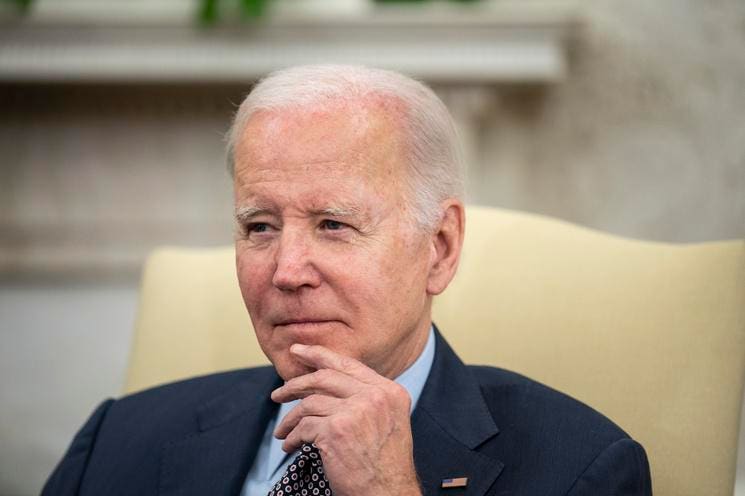As the House prepares to vote on a resolution nullifying President Joe Biden’s signature student loan forgiveness plan and his most recent extension of the student loan pause, the administration has signaled that Biden will veto the measure. This will likely doom this particular repeal effort.
But Biden’s student debt relief plans remain under serious threat. Here’s the latest.
House To Vote On Bill To Repeal Student Loan Forgiveness And End Student Loan Pause
The full House is expected to vote this week on a Congressional Review Act resolution repealing Biden’s student loan forgiveness plan and ending the latest student loan pause extension.
Biden’s student debt relief plan would provide up to $20,000 in student loan forgiveness for nearly 40 million borrowers with government-held loans. Republicans have been critical of the plan, calling it an unfair giveaway with sweeping costs. The plan has remained blocked while the Supreme Court considers two legal challenges.
The Congressional Review Act permits Congress to reverse recently-established regulations with a simple majority vote in the House and Senate. A key House committee approved the Congressional Review Act resolution nullifying Biden’s student debt relief initiatives earlier this month. Next, the full House of Representatives is set to vote on the measure this week, as soon as today. It is expected to pass the House, where Republicans maintain control. The resolution’s fate in the Senate is less certain, as Democrats hold a slim majority in that chamber.
A new report released today by the Student Borrower Protection Center (SBPC) and the American Federation of Teachers (AFT) warns of dire consequences if Biden’s student debt relief plans are reversed.
“Analyzing recently unveiled data by the Department of Education, SBPC and AFT estimate that as many as 268,660 public service workers who accessed debt cancellation from September 2022 through March 2023 through the Public Service Loan Forgiveness (PSLF) program would have $19,502,500,000 in debt put back in place as a result of the CRA scheme,” they warned. That’s because the months of suspended payments associated with the student loan pause can count toward student loan forgiveness for PSLF borrowers; reversing the latest student loan pause extension would undo some of that credit.
“These CRA resolutions, if enacted, will add to the confusion and panic that borrowers all over the country are already experiencing as they wait on the court,” warned the SBPC in a statement.
Biden Expected To Veto Repeal Of Student Loan Forgiveness
Even if the the Congressional Review Act resolution passes both the House and the Senate, it can only become law if President Biden signs the legislation. And this week, the administration confirmed that Biden will veto the measure.
“This resolution is an unprecedented attempt to undercut our historic economic recovery and would deprive more than 40 million hard-working Americans of much-needed student debt relief,” said the Office of Management and Budget in a statement. “If Congress were to pass” the resolution, “the President would veto it.”
Biden’s expected veto would prevent the resolution from becoming law. A two-thirds majority would be needed in both chambers for Congress to override his veto. This would require substantial Democratic defections in both the House and Senate, which is highly unlikely to happen. However, assuming the House passes the measure, it could put several Senate Democrats in a difficult position. A handful of moderate Democrats in the Senate have expressed lukewarm support or even opposition to Biden’s student loan forgiveness plans.
Biden’s Student Debt Relief Plans Remain Threatened
While Biden’s veto would effectively neutralize the Congressional Review Act repeal effort, his student debt relief initiatives continue to face multiple threats.
The administration’s mass student loan forgiveness plan is currently before the Supreme Court, and a ruling is expected sometime next month. Borrower advocates and progressives in Congress are urging Biden to consider potential backup options if the Court strikes down the program. But so far, there are no indications that the administration has any contingency plans.
Meanwhile, House Republicans have also indicated that they want to repeal Biden’s student loan forgiveness plan and the extension of the student loan pause in negotiations with the White House over the debt ceiling. The House passed a debt ceiling bill last month that would repeal those initiatives. However, that bill has virtually no chance of passing the Senate and was widely viewed as just an opening bid in broader negotiations over federal spending. So far, Biden and House Republicans have not reached an agreement to raise the debt ceiling.
At the same time, new legal challenges threaten Biden’s last extension of the student loan pause. The pause is currently set to end 60 days after either June 30th or the date that the Supreme Court issues a decision on the student loan forgiveness challenges. Advocates have warned of chaos if the pause abruptly ends sooner than that.
Further Student Loan Forgiveness Reading
Lowering Student Loan Payments Just Got Easier Amid Uncertainty Over Loan Forgiveness
Student Loan Forgiveness Eligibility Expanded In 3 Ways Under New Account Adjustment Guidance
New Plan Would Update Student Loan Forgiveness Rules For Borrowers Who Leave Qualifying Jobs
$55 Billion In Student Loan Forgiveness Approved, Says Biden Administration — And More May Be Coming
Read the full article here




